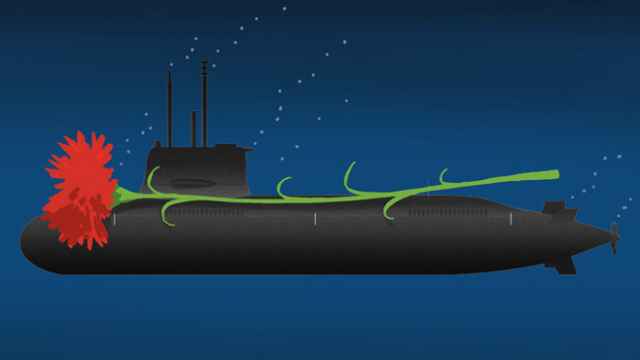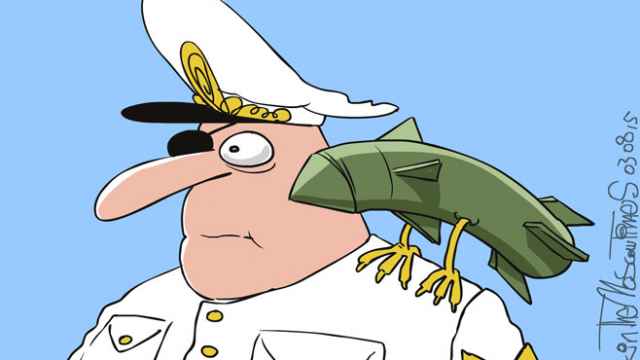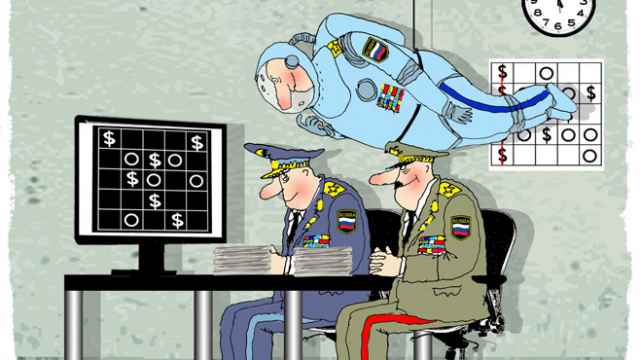It seems that the international community can breathe a sigh of relief after this weekend's standoff on the Korean peninsula. The deadline for the ultimatum that Pyongyang announced has passed without hostilities breaking out. Instead, senior officials from North and South Korea held talks to resolve the confrontation.
As a result, the latest round of North Korean leader Kim Jong Un's favorite game — playing on the nerves of the international community — ended in a draw, and the war that he has been threatening to unleash in recent days never materialized.
He had initially accused the United States and South Korea of threatening North Korea with the joint military maneuvers they conduct every year. Recall that those maneuvers — involving 30,000 U.S. and 50,000 South Korean troops — include scenarios for repulsing a hypothetical invasion by Pyongyang.
North Korea even threatened to use a weapon as yet "unknown to the world" if Washington and Seoul did not halt their exercises. South Korea responded by promising to "strongly retaliate" if attacked. Then the conflict escalated when two South Korean soldiers were maimed by a land mine in the demilitarized zone that Seoul claims Pyongyang planted.
That incident prompted South Korea to broadcast anti-North Korean propaganda over huge loudspeakers aimed at the North — a practice it had not employed in more than 10 years. North Korean forces responded with artillery fire that South Korea returned. After that, both sides quickly put their forces on war footing.
The world froze in anticipation. The fact that North Korea has nuclear weapons meant this was not simply another local conflict. Some experts believe that North Korean missiles can even reach Alaska.
As for Russia, North Korea's nuclear test site is only a few hundred kilometers from the Russian border. Any conflict on the Korean peninsula carries an obvious security threat to this country.
The scenarios of almost all military maneuvers that Russia conducts in its eastern regions includes a response to a so-called "ecological catastrophe" and the influx of thousands of refugees in the event of nuclear war on the Korean peninsula.
However, Russia's Foreign Ministry — that has not been known for mincing words in recent months — for some reason issued a delicately worded and almost timid statement urging the quarreling parties to remain calm and act responsibly.
And for some reason Moscow was in no hurry to condemn Pyongyang for its willingness to unleash a nuclear war on Russia's borders. Of course, Moscow could not but enjoy the fact that someone was openly defying Washington and even hinting at the possibility of a nuclear conflict with the United States. But that is not the only reason for Russia's restraint. A closer look reveals that Moscow's foreign policy is not so different from Pyongyang's.
The basis of both countries' foreign policies is a belief in their own uniqueness and exclusivity. For the North Korean dictatorship, it is found in the idea of "Juche" as symbolized by the winged horse Chollima. For this country, it is the "Russian soul," Prince Vladimir and so on.
Russia's belief in its exclusivity gives rise to certainty in the country's absolute independence. President Vladimir Putin gladly states that Russia is one of the few countries in the world with an absolute sovereignty, meaning that other countries exert no influence whatsoever over it.
What's more, Russia's own citizens exert no influence on political decision-making. Kremlin officials often complain that Western leaders are too dependent on their voters. Clearly, the members of North Korea's Kim dynasty are not dependent on the will of their unfortunate citizens either. On a whim, the national leader can doom every last North Korean to a life of hunger or plunge the country into a nuclear conflict.
This non-Western value system makes both Moscow and Pyongyang entirely unpredictable. How, in fact, can the world predict the actions of leaders who think nothing of sacrificing not only their citizens' welfare, but their very lives? For such leaders, "pride" — or what some claim is the result of an inferiority complex — takes clear precedence over the well-being of their people.
Putin was offended that the West ignored his interests during the change of power in Ukraine and responded by seizing Crimea and unleashing a war in Ukraine. Kim Jong Un responded to South Korea's propaganda blitz with live artillery fire. Both Moscow and Pyongyang constantly flaunt their nuclear weapons. Both Kim and, to a lesser extent Putin, manage to send a signal to the outside world: "Don't touch me, I'm crazy."
And finally, it remains a mystery as to how the two leaders' inner circles affect the decisions they make. It is very possible that both leaders must consistently demonstrate bravado and fearlessness toward the West in order to keep their closest associates in line — people who will attack like a pack of wolves at the first sign of weakness from their leader.
So what is the difference between the two men? Only that Putin has not ordered artillery fire aimed at the West and its allies?
Or is that Moscow has several thousand nuclear warheads while Pyongyang has only a few? If so, that would explain why Kim Jong Un feels compelled to act even more provocatively than his Russian counterpart.
Alexander Golts is deputy editor of the online newspaper Yezhednevny Zhurnal.
A Message from The Moscow Times:
Dear readers,
We are facing unprecedented challenges. Russia's Prosecutor General's Office has designated The Moscow Times as an "undesirable" organization, criminalizing our work and putting our staff at risk of prosecution. This follows our earlier unjust labeling as a "foreign agent."
These actions are direct attempts to silence independent journalism in Russia. The authorities claim our work "discredits the decisions of the Russian leadership." We see things differently: we strive to provide accurate, unbiased reporting on Russia.
We, the journalists of The Moscow Times, refuse to be silenced. But to continue our work, we need your help.
Your support, no matter how small, makes a world of difference. If you can, please support us monthly starting from just $2. It's quick to set up, and every contribution makes a significant impact.
By supporting The Moscow Times, you're defending open, independent journalism in the face of repression. Thank you for standing with us.
Remind me later.







